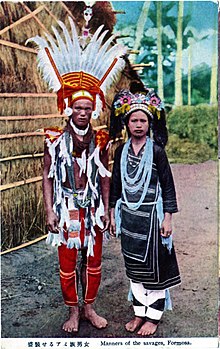Ami people

Pre-WWII postcard of Amis couple
|
|
| Total population | |
|---|---|
| (200,604 (2014)) | |
| Regions with significant populations | |
| Taiwan | |
| Languages | |
| Amis, Mandarin | |
| Religion | |
| Animism, Christianity | |
| Related ethnic groups | |
| Sakizaya, Taiwanese Aborigines |
The Amis (Chinese: 阿美族; pinyin: āměi-zú; also Ami or Pangcah) are an indigenous people of Taiwan. They speak Amis, an Austronesian language, and are one of the sixteen officially recognized peoples of Taiwanese aborigines. The traditional territory of the Amis includes the long, narrow valley between the Central Mountains and the Coastal Mountains (Huatung Valley), the Pacific coastal plain eastern to the Coastal Mountains and the Hengchun Peninsula.
In 2014, the Amis numbered 200,604. This was approximately 37.1% of Taiwan's total indigenous population, making them the largest tribal group. The Amis are primarily fishermen due to their coastal location. They are traditionally matrilineal. Traditional Amis villages were relatively large for indigenous groups, typically between 500 and 1,000. In today's Taiwan, the Amis also comprise the majority of "urban aboriginals" and have developed many "urban tribes" all around the island. In recent decades, Amis have also married exogamously to Han as well as other indigenous people.
The Amis people generally identify themselves as Pangcah, which means "human" or "people of our kind." Nonetheless, in today's Taiwan, Amis is much more frequently used. This name comes from the word amis, meaning "north." There is still no consensus in the academic circle how "Amis" came to be used to address the Pangcah. One supposition is that it was originally used by the Puyuma to call the Pangcah, as the Pangcah lived to the north of them. Another supposition holds that those who lived in the Taitung Plain called themselves "Amis" because their ancestors had come from the north. The later explanation is recorded in the Banzoku Chōsa Hōkokusho, indicating this might originate from what is classified by anthropologists as Falangaw Amis, the Amis group located from today's Chenggong to the Taitung Plain. Their closest genetic relative appears to be the Filipinos.
...
Wikipedia
